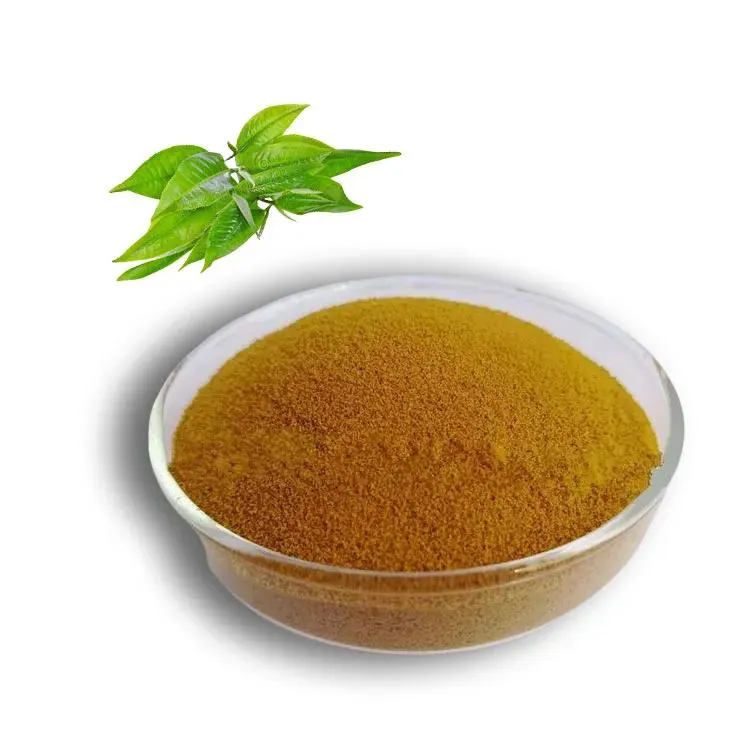- 0086-571-85302990
- sales@greenskybio.com
Side Effects of Green Tea Extract: What You Need to Know
2025-04-02

Green Tea Extract has gained substantial popularity over recent years, hailed for its numerous potential health benefits. Derived from the leaves of Camellia sinensis, Green Tea Extract is rich in polyphenols and catechins, particularly epigallocatechin gallate (EGCG), which are credited with delivering antioxidant, anti-inflammatory, and metabolic benefits. From assisting in weight loss to enhancing brain function and reducing the risk of certain chronic diseases, the health claims surrounding Green Tea Extract are persuasive. However, as with any supplement, it's important not to overlook the potential side effects associated with its use. This article delves into the possible adverse effects of green tea extract, aiming to provide a balanced perspective on its consumption.
Potential Side Effects and Considerations
1. Caffeine Sensitivity and Related Effects: Green tea extract contains caffeine, which, despite being less than what is found in coffee, can still induce side effects, especially in those sensitive to caffeine. Common symptoms include insomnia, anxiety, irritability, nausea, and upset stomach. Caffeine can also cause increased heart rate and palpitations in some individuals. Those with caffeine sensitivities or heart-related conditions should be cautious when consuming green tea extract supplements, as even small amounts can exacerbate these issues.
2. Liver Toxicity: One of the most concerning side effects of green tea extract is its potential to cause liver toxicity. Various studies and case reports have linked high doses or prolonged use of green tea extract supplements to liver damage, leading to symptoms like jaundice, dark urine, abdominal pain, and elevated liver enzymes. In severe cases, it can even result in hepatitis or liver failure that may necessitate medical intervention. The exact mechanism of toxicity is not fully understood, but it is thought to be related to the concentration of catechins, particularly EGCG, which can cause oxidative stress and inflammation within the liver. Therefore, individuals with pre-existing liver conditions or those taking medications that affect the liver should be particularly cautious.
3. Stomach Upset and Gastrointestinal Issues: Some individuals may experience gastrointestinal discomfort as a side effect of green tea extract consumption. This can manifest as stomach upset, nausea, diarrhea, or constipation. The high tannin content in green tea can also increase stomach acid, potentially leading to acid reflux or heartburn, especially when taken on an empty stomach. To mitigate these effects, it is advisable to take green tea extract with food and ensure adequate hydration.
4. Interaction with Medications: Green tea extract can interact with various medications, potentially altering their effectiveness or increasing the risk of side effects. For instance, the caffeine in green tea can enhance the effects of stimulants and interfere with sedatives, anticoagulants, and antiplatelet agents. Additionally, green tea extract can reduce the efficacy of certain blood pressure medications and interfere with the absorption of iron from the diet. It is crucial for individuals taking any medications to consult with a healthcare provider before using green tea extract supplements.
5. Impact on Iron Absorption: The polyphenols present in green tea extract can inhibit the absorption of non-heme iron, which is the type of iron found in plant-based foods. This may lead to iron deficiency anemia, especially in individuals who already have low iron levels or those who follow a vegetarian or vegan diet. To counteract this, it is recommended to consume green tea extract at least an hour before or after meals and to ensure that the diet includes sufficient iron-rich foods or supplements as needed.
6. Allergic Reactions: Although rare, some individuals may experience allergic reactions to green tea extract. Symptoms can range from mild skin rashes to more serious reactions such as difficulty breathing, swelling of the face or lips, and anaphylaxis. Those with known allergies to tea or who experience unusual symptoms after consumption should discontinue use immediately and seek medical advice.

Balancing Benefits with Risks
Despite the potential side effects, many people continue to use green tea extract due to its promising health benefits. The key to minimizing risks lies in moderation and informed consumption. Begin with lower doses to assess individual tolerance and always adhere to recommended doses provided by the manufacturer or health professional. For those with pre-existing health conditions or those taking medication, consulting with a healthcare provider prior to use is indispensable.
Furthermore, opting for high-quality products from reputable sources can mitigate the risk of contamination or mislabeling, which are common concerns in the supplement industry. Being conscientious about both the potential benefits and risks helps in making informed decisions regarding the use of green tea extract.

Conclusion
Green tea extract offers a range of health benefits, but it is not without its share of potential side effects. As with any supplement, it is important to weigh the potential advantages against the risks and to consider individual health needs and circumstances. By understanding the potential side effects and seeking guidance from healthcare professionals, individuals can safely incorporate green tea extract into their wellness regimen and enjoy its benefits while minimizing risks. In this way, green tea extract can be a valuable tool in supporting a healthy lifestyle when used responsibly.
- ▶ Hesperidin
- ▶ citrus bioflavonoids
- ▶ plant extract
- ▶ lycopene
- ▶ Diosmin
- ▶ Grape seed extract
- ▶ Sea buckthorn Juice Powder
- ▶ Beetroot powder
- ▶ Hops Extract
- ▶ Artichoke Extract
- ▶ Reishi mushroom extract
- ▶ Astaxanthin
- ▶ Green Tea Extract
- ▶ Curcumin Extract
- ▶ Horse Chestnut Extract
- ▶ Other Problems
- ▶ Boswellia Serrata Extract
- ▶ Resveratrol Extract
- ▶ Marigold Extract
- ▶ Grape Leaf Extract
- ▶ blog3
- ▶ blog4
- ▶ blog5
-
Is Green Tea Good for Your Kidneys?
2025-04-02
-
Who Shouldn’t Take Green Tea Extract?
2025-04-02
-
What Is the Best Green Tea Extract?
2025-04-02
-
Is Green Tea Extract Anti-Inflammatory?
2025-04-02
-
What Is Green Tea Extract For?
2025-04-02
-
Red Wine Extract
2025-04-02
-
Eucommia Ulmoides Extract
2025-04-02
-
Calendula Extract
2025-04-02
-
Dandelion Leaf Extract
2025-04-02
-
Apricot Powder
2025-04-02
-
Grape Seed Extract
2025-04-02
-
Echinacea Extract
2025-04-02
-
Hericium erinaceus extract powder
2025-04-02
-
Ginger Extract
2025-04-02
-
Honeysuckle Pollen
2025-04-02






























